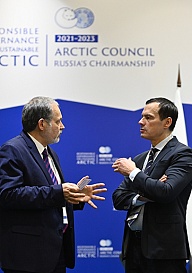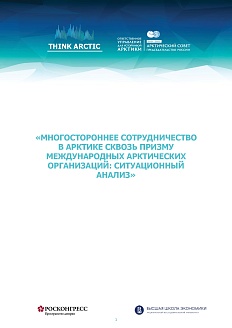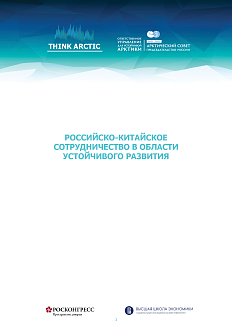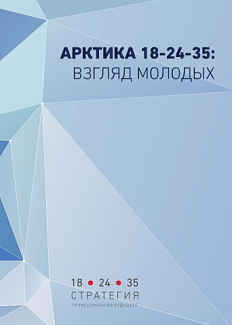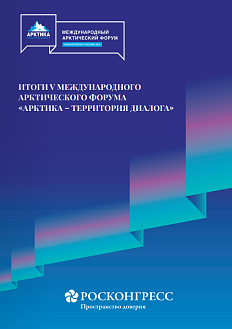The meeting of the Senior Arctic Research Coordination Officials took place on 18 November in a hybrid format in Moscow. The format of the event involved remote participation by foreign delegations. It took place as part of the action plan for Russia’s chairmanship of the Arctic Council in 2021–2023, which is operated by the Roscongress Foundation.
Senior Officials Meetings (SOM) are a crucial part of the Arctic Council’s work. At these meetings, representatives of the Arctic states guide and supervise the council’s activities in accordance with decisions and instructions from their foreign ministers. Delegates from the Arctic Council’s member states (Canada, Denmark, Finland, Iceland, Norway, Russia, Sweden, and the USA), as well as representatives of the Indigenous Peoples of the North, international organizations, and the six working groups of the Arctic Council attended the regular meeting. There were 60 people in total.
Opening the meeting, Nikolai Korchunov, Ambassador-at-Large for the Russian Ministry of Foreign Affairs and Chairman of the Arctic Council’s Senior Arctic Officials’ Committee, recalled that this year the Council is celebrating its 25th anniversary. «For a quarter of a century, despite all the difficulties <...> we have been working together to achieve common goals in the Arctic. The Arctic Council has built a strong foundation for cooperation in this region», he said.
N. Korchunov noted that the Russian chairmanship of the Arctic Council has four main priorities. These are supporting Indigenous Peoples, protecting the environment, socio-economic development of the Arctic territories, and strengthening the role of the council itself. «As the chair of the Arctic Council, Russia supports cooperation in the scientific sphere. <...> Our goal is to increase the efficiency [of scientific cooperation] and improve the scope of the practical application of the results that have already been achieved in the Arctic. In addition, to optimize the use of scientific infrastructure, promote the use of advanced technologies and best practices in the implementation of joint projects», the ambassador added.
Korchunov emphasized the unique role of the Arctic Council’s working groups, which oversee a wide range of the most important issues, including climate change, pollution, and biodiversity. «The working groups include a wide network of experts from the Arctic states, as well as representatives of Indigenous Peoples’ organizations, who are permanent participants in the Arctic Council», reminded the Ambassador-at-Large for the Russian Ministry of Foreign Affairs.
The participants discussed strengthening international Arctic scientific cooperation, holding joint scientific competitions for research projects, and the possibility of establishing a coordinating committee for scientific activities in the Arctic and creating a common international research database of the Arctic countries. One of the critical tasks on the meeting’s agenda was to discuss joint priorities of the Arctic Council member states. The results of the discussion of the Russian initiatives will be presented at the plenary session of the Arctic Council’s SOM committee to be held in Salekhard in December.
Main topics
1. Priorities for research
The Arctic Council was established in 1996 as an intergovernmental forum to promote international cooperation in the Arctic seas. Eight Arctic states and six permanent indigenous participant organizations are members of the council. In addition, more than 35 observer states and international organizations are represented. This year, for the second time in the organization’s history, Russia became chair of the council and will serve in that capacity from 2021 to 2023. The cross-cutting priority of Russia’s chairmanship of the Arctic Council will be ’Responsible Governance for a Sustainable Arctic’.
The meeting continued to discuss priorities for research in the Arctic, as well as the creation of a white paper, a document necessary for joint scientific research in the Arctic.
Polar Year
The most important of the Russian initiatives proposed at the meeting was the organization of the Fifth International Polar Year (IPY) in 2032-2033. Its adoption, according to the Russian participants in the Arctic Council, would create the conditions for joint polar research by the Arctic states.
2. Establishment of a coordinating committee
The biggest discussion among senior officials was about the Russian initiative to establish a coordinating committee for scientific activities in the Arctic. Presenting the project, Sergey Terashkevich, Deputy Director of the Department of International Cooperation of the Ministry of Education and Science of the Russian Federation and Chairman of the meeting, said that the climate changes occurring in the polar latitudes require an early response from the international community, and the efforts of researchers from different countries can be more effective if coordinated and carried out together, complementing rather than duplicating each other.
According to D. Farrell, the committee is a small group of representatives of the Arctic states who would work together to promote scientific initiatives in the Arctic. S. Terashkevich specified that the proposed body could engage in the coordination of scientific research and inform all participants of the Arctic Council about the results of work in northern latitudes by scientists of the Council’s member states.
In addition, the committee would draw the attention of Arctic countries’ representatives to scientific conferences, seminars and other events, attracting more participants to them. Another task of the new body could be to create links between national research-oriented institutes in the Arctic and the Arctic Council.
Competitions for scientists
Irina Kuklina, Executive Director of the International Centre for Innovation in Science, Technology and Education, spoke at the meeting about competitions for joint R&D projects on the basis of common funding. According to S. Terashkevich, the coordinating committee could also supervise such competitions.
I. Kuklina said that practical work on the preparation of proposals would start next year during workshops on the implementation of joint action mechanisms. However, she stressed that it remains to be decided which countries and organizations can participate in joint programmes, finance them or provide research sites. Another task is to work out the criteria for selecting participants in the calls for proposals. The Arctic Council also needs to keep in mind how to follow-up the supported projects, and how to monitor their results and practical application. «[When conducting calls for proposals], we have to determine precisely the degree of participation of Indigenous Peoples [in collaborative research projects]», she added.
The workshops are intended to identify mechanisms for calls for proposals for joint research projects. It is planned to involve scientists and representatives, and organizations willing to fund research. The first of such workshops is proposed to be held via videoconference as early as January 2022.
Snowflake Station
According to Korchunov, one of the main platforms for scientific cooperation at high latitudes could be the Snowflake International Arctic Station. The Russian delegation presented this project, which focuses on joint research in the field of carbon-free energy, at a meeting of the Arctic Council’s Sustainable Development Working Group in 2019.
The Snowflake International Arctic Station is a year-round and fully autonomous complex that will be powered by renewable energy and hydrogen energy. «This station has always been an engine for supporting cooperative research on climate change as well as pollution, including pollution of the oceans. This station is one example of how Russia is trying to promote, to strengthen scientific cooperation in the Arctic», said the Ambassador-at-Large for the Russian Ministry of Foreign Affairs.
As reported earlier in November, at a meeting of the Arctic Council’s Sustainable Development Working Group, two sites for the station will be located on Yamal and in the Murmansk region. They will be used to test environmentally friendly life-support technologies, as well as robotics, telecommunications, medicine, biotechnology and new materials systems. The sites will differ: While Yamal will have a completely autonomous site based on wind and solar power and, above all, on the hydrogen cycle, the Murmansk region will rely on hydrogen, which will be produced externally, in particular at an external wind farm and hydropower plant.
The project has been approved by all the member states of the Arctic Council and is supported by the Russian Government. The Institute of Arctic Technology at the Moscow Institute of Physics and Technology is implementing it. Construction of the stations is scheduled to begin next autumn, with a view to putting them into test operation in 2024.
3. International research base
Another task of the Russian Chairmanship of the Arctic Council is to create an international database of Arctic states and update the existing database of those research projects conducted in the polar region.
The existing system of the Third Arctic Science Forum (ASM3), held in May this year by Iceland and Japan, could serve as the basis for the new international platform
The BIN project, a collaborative academic study of business activity and opportunities, was carried out by Russian, Norwegian, Finnish and Swedish academics at the initiative of the Nordic Development Centre at the Nordic University Business School in Norway. It is a database of economic, demographic and other indicators of the Arctic and aims to optimize financial and management projects in the region. The database will be available not only to scientists but also to all stakeholders as a tool for monitoring developments in the region and establishing new partnerships. In doing so, it will include all the scientific material produced in the three past Arctic Science Forums and take into account the experience of all the Arctic states.
The participants of the meeting noted that the presented project is ambitious and requires serious elaboration. In particular, it is necessary to determine its cost and sources of financing, select executors who will fill in the database and define areas of responsibility.
Ocean of knowledge
In addition to the ASM3 system, there are other databases that can be used to create the new platform. There are intra-national databases. In Norway, for example. And there are international ones, one of which is conducted within the AMAP (Arctic Monitoring and Assessment Programme) organization, which was established in 1991 and is one of the working groups of the Arctic Council. This working group studies the impact of pollutants and climate change on ecosystems and human health in the Arctic.
Russia has implemented a project for a unified state system of information on the situation in the world’s oceans, which is publicly available on the Internet portal and can be integrated into an international platform. This system is operated by 17 centres and 20 information providers representing various ministries, departments and the Russian Academy of Sciences.
The unified information system on the world’s oceans established in Russia also includes data on the meteorological situation in the polar region.
Polar Radio
The final proposal was a Russian initiative to establish a cross-border digital polar radio broadcasting service at the Senior Officials Meeting.
The project plans to revive powerful radio broadcasting for the Far North and equivalent areas on a modern digital platform. This will make it possible to create a unified information space in the territory of the Arctic, as well as a unique targeted notification system to improve safety, including during polar expeditions, various works and events in the Far North.
The radio channel will broadcast on the Internet and on shortwave, which will make it possible to deliver information, including alerts, anywhere in the world. It is proposed to broadcast in English and five northern indigenous languages. The International Consortium for the Preservation of Arctic Cultural Heritage, based at the RSHU, could be involved in the project to provide content for the radio channel.
For more analytical materials on the Arctic agenda, see the Roscongress Information and Analytical System roscongress.org/en/knowledge/arktika/materials/.


